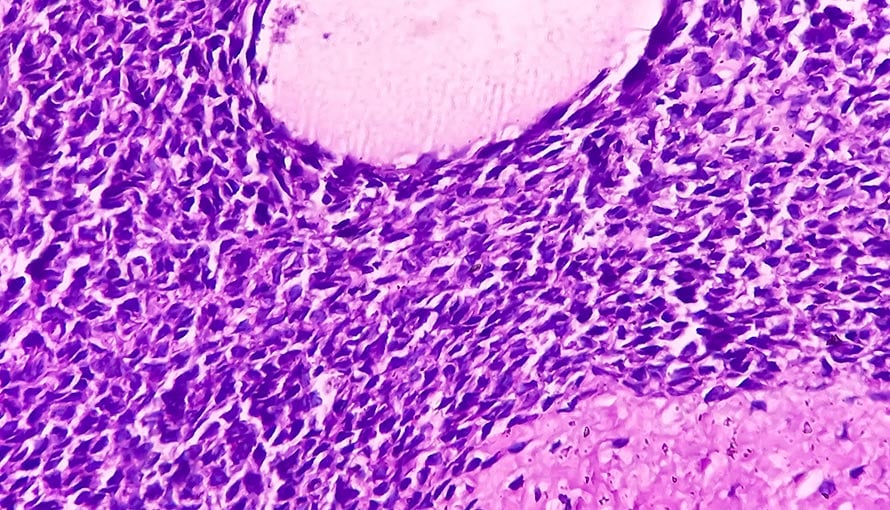Synovial Sarcoma

Synovial sarcoma is an uncommon and aggressive cancer that can form in soft tissues such as muscles, fat, joint linings and ligaments. It’s diagnosed in around 1,000 people every year, many of whom are teenagers and young adults.
What causes synovial sarcoma?
The precise causes of synovial sarcoma are unknown, although research shows this cancer is linked to unusual changes in chromosomes—gene-containing cell components that break apart and come back together. In a synovial sarcoma tumor cell, chromosome 18 and chromosome X switch places, leading to a mutant gene that is believed to contribute to this cancer.
Synovial sarcoma is rare, affecting one to three people in every 1 million in the U.S. Still, a few risk factors have been identified for this cancer, including:
- Being younger than 35
- Receiving radiation therapy for a previous cancer
- Frequent exposure to chemicals such as vinyl chloride, arsenic and thorium dioxide
- Long-term swelling in the legs or arms
What are the symptoms of synovial sarcoma?
Synovial sarcoma tends to form slowly—in fact, some tumors can go undetected for as long as two years. As the disease progresses, symptoms will begin to develop around the affected area. These may include:
- A painless lump that forms underneath the skin
- Sudden, sharp pains
- An area of swelling
Most cases of synovial sarcoma occur in soft tissues around large joints such as the knees, hips, ankles and shoulders. Rarely, tumors may form around the chest, neck or head and impact breathing or swallowing.
How is synovial sarcoma diagnosed?
Synovial sarcoma symptoms are sometimes mistaken for noncancerous (benign) conditions that are far more common. If a physician suspects sarcoma may be to blame, the following tests may be performed to rule out or diagnose cancer:
- Imaging tests, such as X-ray imaging, magnetic resonance imaging (MRI) or a computerized tomography (CT) scan, to view pictures of the affected tissues
- Genetic testing to scan for mutations related to synovial sarcoma tumors
- A biopsy, during which all or a portion of the tumor is removed and evaluated for cancerous cells under a microscope
Following a synovial sarcoma diagnosis, a physician will stage the cancer based on its size, whether it has spread to other areas of the body and if so, how far. Soft tissue sarcomas are staged from 1 to 4, with 4 being the most advanced stage.
What are the treatment options for synovial sarcoma?
The details of a patient’s synovial sarcoma treatment plan will depend on several factors, including the cancer’s stage, its specific location and the patient’s age and overall health. As is the case with most cancers, synovial sarcoma that is diagnosed in an early stage often has more available treatment options and a better prognosis than late-stage sarcomas.
Surgery to remove tumors is the primary form of treatment for synovial sarcoma. Other treatment approaches include:
- Radiation therapy – Targeted radiation beams that help shrink tumors and destroy cancer cells in a specific area
- Chemotherapy – Potent medications administered orally or intravenously to attack cancer cells throughout the body
- Immunotherapy – Medications that help the patient’s immune system better identify and fight off cancer cells
- Anti-angiogenesis drugs – Medications that inhibit blood vessel growth around tumors, cutting off their blood supply
- Targeted therapy – Medications designed to impede the processes that fuel cancer growth
Moffitt’s approach to synovial sarcoma
While many oncologists see only a handful of synovial sarcoma cases in their lifetime—if any—Moffitt Cancer Center’s Sarcoma Program features a multispecialty team that routinely addresses uncommon and complex diseases, including this one. To schedule an appointment at Moffitt—Florida’s No. 1 cancer hospital—call 1-888-663-3488 or submit a new patient registration form online. A referral is not necessary to visit Moffitt, and you’ll be connected with an expert in just one day.
References
National Cancer Institute: Synovial Sarcoma
American Cancer Society: Soft Tissue Sarcoma
